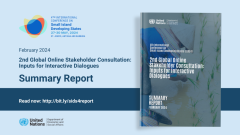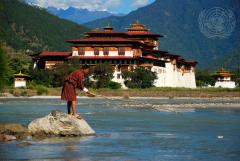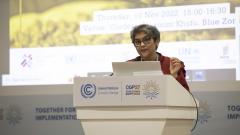- عربي
- 中文
- English
- Français
- Русский
- Español
Opening Remarks at the Side Event on Fostering the Participation of LLDCS in the Ocean Economy
Remarks by Ms. Fekitamoeloa Katoa ‘Utoikamanu, High Representative for the Least Developed Countries, Landlocked Developing Countries and Small Island Developing States
17 June 2019
New York, USA
Excellencies,
Distinguished delegates,
Ladies and gentlemen,
The Ocean is an important part of humanity and a common heritage to mankind. The ocean makes about seventy-one percent of the Earth’s surface and billions of people depend on the oceans for their livelihoods. Maritime transport remains an essential part of international trade as over 90% is carried by the seas, according to the United Nations International Maritime Organization. It is estimated that the value of key ocean assets is US$24 trillion, with an annual value of goods and services at US$2.5 trillion.
Due to its significance, the ocean economy, is growing in importance and gaining momentum amongst policymakers across the world. Participation in the ocean economy and the global discussions on the ocean economy are however not fully inclusive and not fully understood. The participation of landlocked developing countries continue to be limited.
Excellencies and distinguished delegates, Ladies and gentlemen
Landlocked countries are not directly connected to the oceans due to their geographical location, but the United Nations Convention on the Law of the Sea gives them rights to access and to use the ocean space including the marine resources. Some of the provisions that give the right to access and to utilize the Oceans by the landlocked countries include: article 69 on Right of land-locked States, Article 125 on Right of access to and from the sea and freedom of transit, Article 136 on Common heritage to mankind and Article 140 on Benefit of mankind. UNCLOS also states that the Area and its resources are common heritage of mankind and activities in the Area are to be carried out for the benefit of mankind as a whole irrespective of the geographical location of States. It is therefore necessary that no country, including LLDCs, should be left behind in the exploitation of the resources regarded as common heritage to mankind.
Out of the forty-four landlocked states, twenty-eight have ratified the UNCLOS and twenty of these countries are Landlocked Developing Countries. Six LLDCs have signed the Convention but have not ratified it and six have neither signed nor acceded to the Convention or the Agreement.
While twenty LLDCs are parties to the United Nations Convention on the Law of the Sea their participation in the ocean economy, including in the meetings related to the implementation of UNCLOS, is however limited. The limited participation of these countries can be attributed to several reasons such as limited resources, lack of awareness and challenges of access. LLDCs are also faced with transit challenges, which include inadequate transit infrastructure and cumbersome transit procedures. Challenges in accessing the sea greatly affect the participation of the LLDCs in international trade and achieving sustainable development. It is therefore important to enhance access and freedom of transit of the LLDCs so that they can be integrated into global trade and into the blue economy. The implementation of the Vienna Programme of Action and other international and regional agreements that can facilitate transit is therefore fundamental. These include the Revised Kyoto Convention (2006), World Trade Organization Trade Facilitation Agreement, and United Nations Convention on the Law of the Sea. The development of transit infrastructure is also fundamental in this regard.
OHRLLS, in collaboration with transit countries, development partners and relevant international organizations continues to make efforts to facilitate the integration of the LLDCs into the global economy. OHRLLS continues to advocate for efficient transit for LLDCs to access the sea and has previously organized events to discuss these issues and some of the recent events include a side event on importance of Efficient transit cooperation for the achievement of the SDGs by Landlocked Developing Countries held in 2017; a Side event at the Global Sustainable Transport Conference on Financing Sustainable Transport Infrastructure for enhancing Connectivity of the LLDCs; side event held during the Ocean Conference in 2017 on “Enhancing the participation of the Landlocked States in the implementation of Sustainable Development Goal (SDG) 14”, a High-Level Meeting for the Euro-Asia Region on Improving Cooperation on Transit, Trade Facilitation and the 2030 Agenda for Sustainable Development held in 2017 and Ministerial Meeting of LLDCs on Trade and Transport held in 2018. OHRLLS also published several reports on improving transit cooperation and trade facilitation.
Excellencies, Ladies and Gentlemen,
The 17 Sustainable Development Goals are integrated, indivisible, and universal. The initiatives to implement SDG 14 on conserve and sustainably use the oceans, seas and marine resources should therefore include landlocked countries. It is therefore fundamental to build their capacity to participate in the ocean economy and ensure that no one is left behind.
Today’s event is organized to deliberate on how access to the sea as well as the participation of the landlocked countries in the blue economy can be enhanced. Integrating these countries will ensure that they are not left behind including in taking part in the conservation and sustainable use of the oceans and marine resources.
I look forward to our dialogue and recommendations on how we can foster the participation of LLDCs in the Ocean Economy.
I thank you for your kind attention.





